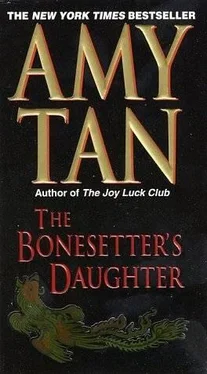GaoLing looked to the side to make sure no one was close enough to hear. "Those people were awful." She made a face. "So bad you can't even imagine how bad. The son had many problems. Did your mother write about this?"
Ruth nodded. "He was hooked on opium."
GaoLing looked momentarily taken aback, realizing that LuLing had been thorough in her account. "This is true," she conceded. "Later he died, maybe in 1960, though no one is sure-for-sure. But that was when he stopped writing and calling different people, threatening this and that to get them to send money."
"Uncle Edmund knows about him?"
GaoLing huffed. "How could I tell him that I was still married? Your uncle would then question if we are really married, if I am a bigamist, if our children are-well, like your mother. Later, I forgot to tell him, and when I heard my first husband was probably dead, it was too late to go back and explain what should be forgotten anyway. You understand."
"Like your age."
"Exactly. As for the Chang father, well, in 1950, the Communists cracked down on all the landlords. They put the Chang father in jail and beat a confession from him for owning many businesses, cheating people, and trading in opium. Guilty, they said, and shot him, public execution."
Ruth pictured this. She was against the death penalty in principle, but felt a secret satisfaction that the man who had caused her grandmother and mother so much misery had met a fitting end.
"The people also confiscated his house, made his wife sweep the streets, and all his sons were sent to work outdoors in Wuhan, where it's so hot most people would rather bathe in a vat of boiling oil than go there. My father and mother were glad they were already poor and didn't have to suffer that kind of punishment."
"And Sister Yu, Teacher Pan. Did you hear from them?"
"My brother did-you know, Jiu Jiu in Beijing. He said Sister Yu was promoted many times, until she was a high-position Communist Party leader. I don't know her title, something to do with good attitude and reforms. But during the Cultural Revolution, everything got turned around, and she became an example of bad attitude because of her background with the missionaries. The revolutionaries put her in jail for a long time and treated her pretty hard. But when she came out, she was still happy to be a Communist. Later, I think she died of old age."
"And Teacher Pan?"
"Jiu Jiu said the country one year held a big ceremony for the Chinese workers who helped discover Peking Man. The newspaper article he sent me said Pan Kai Jing-the one your mother married-died as a martyr protecting the whereabouts of the Communist Party, and his father, Teacher Pan, was present to receive his honorable-mention award. After that, I don't know what happened to Teacher Pan. By now, he must be dead. So sad. We once were like family. We sacrificed for each other. Sister Yu could have come to America, but she let your mommy and me have this chance. That's why your mommy named you after Sister Yu."
"I thought I was named after Ruth Grutoff."
"Her too. But your Chinese name comes from Sister Yu. Yu Luyi. Luyi, it means 'all that you wish."'
Ruth was amazed and gratified that her mother had put so much heart into naming her. For most of her childhood, she had hated both her American and her Chinese names, the old-fashioned sound of "Ruth," which her mother could not even pronounce, and the way "Luyi" sounded like the name of a boy, a boxer, or a bully.
"Did you know your mommy also gave up her chance to come to America so I could come first?"
"Sort of." She dreaded the day GaoLing would read the pages describing how she had wangled her way to the States.
"Many times I've thanked her, and always she said, 'No, don't talk about this or I'll be mad at you.' I've tried to repay her many times, but she always refused. Each year we invite her to go to Hawaii. Each year she tells me she doesn't have the money."
Ruth nodded. How many times she had had to suffer listening to her mother complain about that.
"Each time I tell her, I'm inviting you, what money do you need? Then she says she can't let me pay. Forget it! So I tell her, 'Use the money in the Charles Schwab account.' No, she doesn't want that money. She still won't use it."
"What Charles Schwab account?"
"This she didn't tell you? Her half of the money from your grandparents when they died."
"I thought they just left her a little bit."
"Yes, that was wrong of them to do. Very old-fashioned. Made your mommy so angry. That's why she wouldn't take the money, even after your Uncle Edmund and I said we could divide it in half anyway. Long time ago, we put her half in T-bills. Your mommy always pretended she didn't know about it. But then she'd say something like, 'I hear you can make more money investing in the stock market.' So we opened a stock market account. Then she said, 'I hear this stock is good, this one is bad.' So we knew to tell the stockbroker what to buy and sell. Then she said, 'I hear it's better to invest yourself, low fees.' So we opened a Charles Schwab account."
A chill ran down Ruth's arms. "Did some of those stocks she mentioned include IBM, U.S. Steel, AT T, Intel?"
GaoLing nodded. "Too bad Uncle Edmund didn't listen to her advice. He was always running after this IPO, that IPO."
Ruth now recalled the many times her mother had asked Precious Auntie for stock tips via the sand tray. It never occurred to her that the answers mattered that much, since her mother didn't have any real money to gamble with. She thought LuLing followed the stock market the way some people followed soap operas. And so when her mother presented her with a choice of stocks, Ruth chose whichever was the shortest to spell out. That was how she decided. Or had she? Had she also received nudges and notions from someone else?
"So the stocks did well?" Ruth asked with a pounding heart.
"Better than S and P, better than Uncle Edmund-she's like a Wall Street genius! Every year it's grown and grown. She hasn't touched one penny. She could have gone on lots of cruises, bought a fancy house, nice furniture, big car. But no. I think she has been saving it all for you… Don't you want to know how much?"
Ruth shook her head. This was already too much. "Tell me later." Instead of feeling excited about the money, Ruth was hurt to know that her mother had denied herself pleasure and happiness. Out of love, she had stayed behind in Hong Kong, so GaoLing could have a chance at freedom first. Yet she would not take love back from people. How did she become that way? Was it because of Precious Auntie's suicide?
"By the way," Ruth now thought to ask, "what was Precious Auntie's real name?"
"Precious Auntie?"
"Bao Bomu."
"Oh, oh, oh, Bao Bomu! You know, only your mother called her that. Everyone else called her Bao Mu."
"What's the difference, 'Bao Bomu' and 'Bao Mu'?"
"Bao can mean 'precious,' or it can mean 'protect.' Both are third tone, baaaaooo. And the mu part, that stands for 'mother,' but when it's written in bao mu, the mu has an extra piece in front, so that the meaning is more of a female servant. Bao mu is like saying 'baby-sitter,' 'nursemaid.' And bomu , that's 'auntie.' I think her mother taught her to say and write it this way. More special."
"So what was her real name? Mom can't remember, and it really bothers her."
"I don't remember either… I don't know."
Ruth's heart sank. Now she would never know. No one would ever know the name of her grandmother. She had existed, and yet without a name, a large part of her existence was missing, could not be attached to a face, anchored to a family.
"We all called her Bao Mu," GaoLing went on, "also lots of bad nicknames because of her face. Burnt Wood, Fried Mouth, that sort of thing. People weren't being mean, the nicknames were a joke… Well, now that I think of this, they were mean, very mean. That was wrong."
Читать дальше












